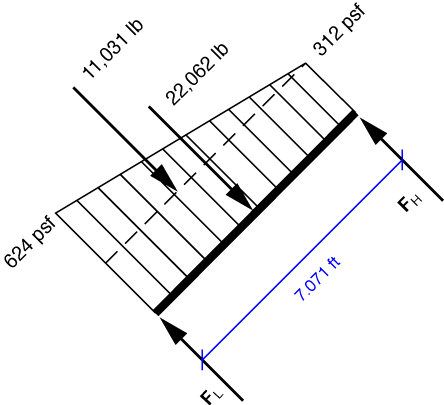Den Hartog’s Mechanics
A web-based solutions manual for statics and dynamics
Problem 68
The pressure on the door is perpendicular to the door and equal to the product of the water’s unit weight of 62.4 pcf and the water’s depth. The free-body diagram for the door is

We’ve broken the trapezoidal distributed pressure into a constant pressure of 312 pcf and a triangular pressure with maximum of 312 pcf at the lower part of the door. The resultant forces are
for the constant pressure, and
for the triangular pressure. These resultants are located one-half and one-third, respectively, of the distance from the lower end of the door. Moment equilibrium about the lip at the bottom of the door gives us
Solving gives us F_H = 14,708\,\rm{lb}. Force equilibrium in the direction perpendicular to the door gives us
The answers in the back of the book match these figures (after rounding off), but the directions given in the book are wrong. The book says these reaction forces are “directed vertically to the door.” Clearly, the correct answer is that they are “directed perpendicularly to the door.”
Last modified: January 22, 2009 at 8:32 PM.

